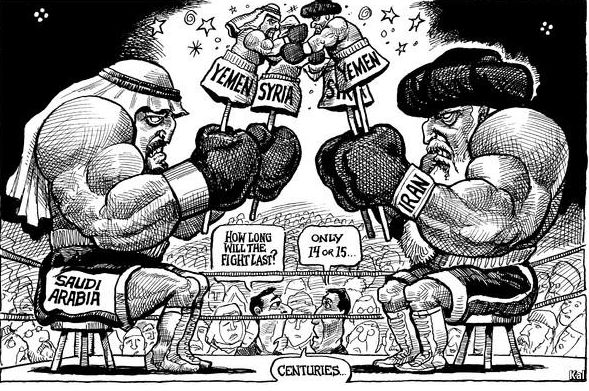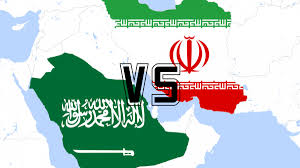
Iran and Saudi Arabia Battle for Supremacy in the Middle East
|
The
struggle between Iran and Saudi Arabia has insinuated itself into
nearly every regional issue, fracturing international alliances and
sustaining wars across the region, while raising fears of a direct
conflict between the two powers. Meanwhile, the region is rife with
ongoing conflicts, and the long-simmering dispute between Israel and
Palestine continues to flare up periodically.
|
|
|
|
 Over
the past decade, the struggle between Iran and Saudi Arabia for
dominance in the Middle East has insinuated itself into nearly every
regional issue, fracturing international alliances and sustaining wars
across the region, while raising fears of a direct conflict between the
two powers that could involve the U.S. Now both sides seem to be seeking
a diplomatic offramp to confrontation, amid a broader shift toward
lowering tensions across the region. Over
the past decade, the struggle between Iran and Saudi Arabia for
dominance in the Middle East has insinuated itself into nearly every
regional issue, fracturing international alliances and sustaining wars
across the region, while raising fears of a direct conflict between the
two powers that could involve the U.S. Now both sides seem to be seeking
a diplomatic offramp to confrontation, amid a broader shift toward
lowering tensions across the region.
Saudi
Arabia ramped up its regional adventurism after Mohammed bin Salman,
the powerful son of King Salman known as MBS, was appointed crown prince
in 2017. From the Syrian civil war to the Saudi-led war in Yemen, that
has meant proxy conflicts with Iran-backed regimes and nonstate armed
groups that have on several occasions veered dangerously close to direct
hostilities between the two rivals. A precision missile and drone
strike on Saudi oil facilities in 2019 was widely blamed on Iran. And
the Trump administration’s confrontational approach to Tehran brought
the U.S. and Iran to the brink of war in January 2020, with direct
implications for Riyadh.
President
Joe Biden has now reengaged diplomatically with Iran in an effort to
revive the 2015 multilateral nuclear deal that the Trump administration
withdrew from. Though those talks have now stalled, they coincide with
broader moves across the Middle East to mend ties that had been frayed
by the region’s various arenas of conflict and competition. Biden has
also promised to make respect for human rights a central pillar of his
foreign policy. The potential implications for U.S. partners in the
Middle East, particularly Saudi Arabia, are significant, although to
date Biden has not radically changed America’s policies in the region.
More recently he visited the kingdom and met with MBS, despite having
promised to make Saudi Arabia a pariah state, in effort to rally
Washington’s Gulf partners to the U.S. side in its standoff with Russia
over the war in Ukraine. But tensions have once again spiked over
Riyadh’s alignment with Moscow to keep global oil prices high, despite
pressure from Washington to increase production.
|
|

|
|
A
group of Iranians listen to President Hassan Rouhani during a ceremony
marking the 40th anniversary of the Islamic Revolution, Tehran, Iran,
Feb. 11, 2019 (AP photo by Vahid Salemi).
|
|
With
a recent cease-fire having lapsed, the ongoing civil war in Yemen is
set to continue fueling one of the world’s worst humanitarian crises.
Syria’s 11-year civil war has now entered an extended endgame that,
though less bloody, remains every bit as volatile. Libya has seen a
respite in its civil war since a cease-fire was implemented in October
2020 and a transitional government named in March 2021, but its
political transition to elections has now hit an increasingly tense
impasse. Above all, the absence of fighting in these countries by no
means guarantees the establishment of lasting peace.
Meanwhile,
the most recent round of fighting between Israel and Hamas in May 2021
served as a reminder that the conflict between Israel and Palestine
cannot be simply wished away by regional powers and the United States.
Like everything else in the region, this conflict has become entangled
in the larger Saudi-Iran power struggle, with Saudi-allied leaders
willing to remain silent on the Palestinian issue in return for Israeli
support in containing Iran. The U.S.-brokered diplomatic normalization
deals Israel signed in the final months of the Trump administration with
the United Arab Emirates and Bahrain simply formalized a strategic
realignment that had until then been an open secret in the region. The
question now is whether Saudi Arabia will follow suit. But normalization
with Israel without a final settlement of the Israel-Palestine conflict
no longer seems as tenable a position as it did before, particularly in
the aftermath of elections that signal the return of former Prime
Minister Benjamin Netanyahu at the head of a government that will likely
include far-right parties certain to alienate Israel’s newfound
partners in the Gulf.









No comments:
Post a Comment
Note: Only a member of this blog may post a comment.